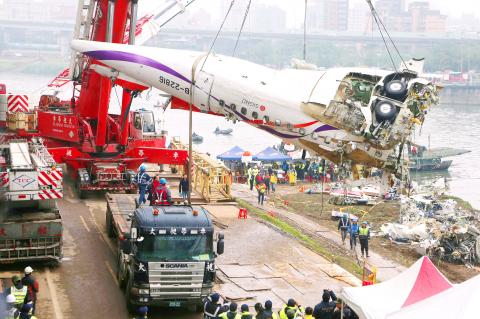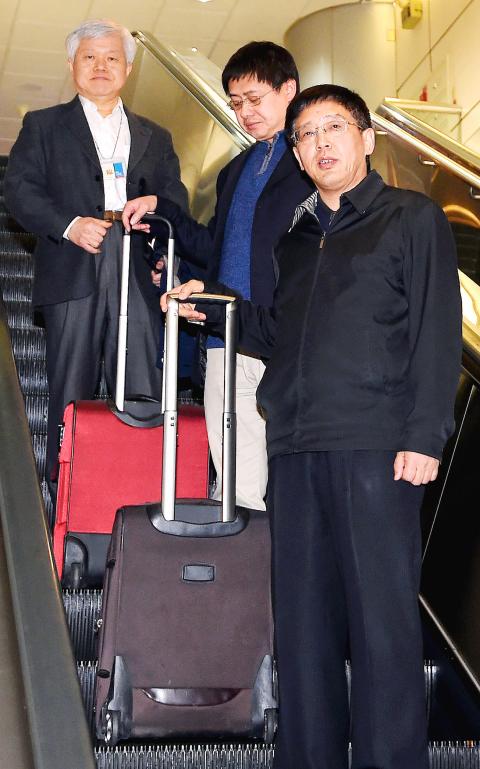The Executive Yuan yesterday said China would take part in the investigation of the crash of TransAsia Airways (復興航空) Flight GE235, adding that the move is “in accordance with international conventions.”
Executive Yuan spokesperson Sun Lih-chyun (孫立群) confirmed that China is to participate in the investigation and the government would ask the Mainland Affairs Council to pay extra attention to the issue of jurisdiction to prevent it being overstepped.
A Cabinet official said that according to the Convention on International Civil Aviation’s Aircraft Accident and Incident Investigation standards, the nation in which the aircraft is registered, the nations where its passengers were from and the nation that built or manufactured the aircraft are all entitled to take part in an investigation.

Photo: CNA
The official added that a “cross-strait cooperation agreement on flight safety and airworthiness directive” is under negotiation, although not yet signed, and the basic framework of the agreement would be used for the two nations to work on the investigation.
As Flight GE235 was carrying 31 Chinese passengers, Aviation Safety Council Executive Director Thomas Wang (王興中) said that China said it wanted to participate in the investigation.
“We have contacted Chinese government officials and informed them that the council can help them secure documents to enter the nation. However, Beijing has yet to indicate who and how many officials would come,” he said, adding that this would be the first time Chinese officials would join the council in an aircraft accident investigation.

Photo: Chu Pei-hsiung, Taipei Times
China’s Taiwan Affairs Office spokesperson Ma Xiaoguang (馬曉光) said in Beijing that there exists a communication mechanism between the two nations for inviting participation in investigations should major aircraft accidents occur.
Ma said that Taiwan has issued an invitation and confirmed that China’s civil aviation department would send personnel to assist in the investigation, adding that the group would be coming to Taiwan for a civil aviation “mini cross-strait meeting” — a term that puts emphasis on its non-governmental nature.
Some netizens cast doubt on the government’s consent to Chinese participation. A netizen with the username “Karsho” said on the Professional Technology Temple (PTT) Web site — the nation’s largest online bulletin board — that according to Article 26 of the Convention on International Civil Aviation: “In the event of an accident to an aircraft of a contracting state occurring in the territory of another contracting state ... the state in which the accident occurs will institute an inquiry into the circumstances of the accident, in accordance, so far as its laws permit, with the procedure which may be recommended by the International Civil Aviation Organization.”
Insofar as Taiwan is both the nation where the accident occurred and the nation in which the aircraft was registered, “Taiwan should have exclusive jurisdiction over the investigation ‘according to the regulations’ and should not have China overstep like this,” Karsho said.
“We sent our people to Japan, with the consent of the Japanese government for the China Airlines (中華航空) crash in Nagoya in 1994 to gain knowledge of the events,” Karsho said. “As investigation is part of the authority of the nation where the accident occurred, Taiwan at the time could only wait for Japan’s official investigation report.”
Other netizens questioned whether Taiwan had been allowed to participate in the investigation of the Qiandao Lake (千島湖) incident in China’s Zhejiang Province in 1994, and said that China might take this as an opportunity to act as if it was sovereign over Taiwan.
“Why do we want a nation that follows the rule of one man to participate in the investigation of a nation abiding by the rule of law?” a netizen asked.
Democratic Progressive Party Legislator Lee Kun-tse (李昆澤) said that according to the international convention and cross-strait agreements, China could send a specialist to Taiwan to obtain information about what happened, to undertake the task of identifying the people killed and gain access to the investigation report, but it has no right to participate in the judicial investigation.
Chinese Nationalist Party (KMT) Legislator Lo Shu-lei (羅淑蕾) asked the public not to “politicize everything” and said it is understandable that China wants to know more as the accident involves its citizens.
Additional reporting by Shelley Shan

INVESTIGATION: The case is the latest instance of a DPP figure being implicated in an espionage network accused of allegedly leaking information to Chinese intelligence Democratic Progressive Party (DPP) member Ho Jen-chieh (何仁傑) was detained and held incommunicado yesterday on suspicion of spying for China during his tenure as assistant to then-minister of foreign affairs Joseph Wu (吳釗燮). The Taipei District Prosecutors’ Office said Ho was implicated during its investigation into alleged spying activities by former Presidential Office consultant Wu Shang-yu (吳尚雨). Prosecutors said there is reason to believe Ho breached the National Security Act (國家安全法) by leaking classified Ministry of Foreign Affairs information to Chinese intelligence. Following interrogation, prosecutors petitioned the Taipei District Court to detain Ho, citing concerns over potential collusion or tampering of evidence. The

Seventy percent of middle and elementary schools now conduct English classes entirely in English, the Ministry of Education said, as it encourages schools nationwide to adopt this practice Minister of Education (MOE) Cheng Ying-yao (鄭英耀) is scheduled to present a report on the government’s bilingual education policy to the Legislative Yuan’s Education and Culture Committee today. The report would outline strategies aimed at expanding access to education, reducing regional disparities and improving talent cultivation. Implementation of bilingual education policies has varied across local governments, occasionally drawing public criticism. For example, some schools have required teachers of non-English subjects to pass English proficiency

‘FORM OF PROTEST’: The German Institute Taipei said it was ‘shocked’ to see Nazi symbolism used in connection with political aims as it condemned the incident Sung Chien-liang (宋建樑), who led efforts to recall Democratic Progressive Party (DPP) Legislator Lee Kun-cheng (李坤城), was released on bail of NT$80,000 yesterday amid an outcry over a Nazi armband he wore to questioning the night before. Sung arrived at the New Taipei City District Prosecutors’ Office for questioning in a recall petition forgery case on Tuesday night wearing a red armband bearing a swastika, carrying a copy of Adolf Hitler’s Mein Kampf and giving a Nazi salute. Sung left the building at 1:15am without the armband and apparently covering the book with a coat. This is a serious international scandal and Chinese

NEGOTIATIONS: The US response to the countermeasures and plans Taiwan presented has been positive, including boosting procurement and investment, the president said Taiwan is included in the first group for trade negotiations with the US, President William Lai (賴清德) said yesterday, as he seeks to shield Taiwanese exporters from a 32 percent tariff. In Washington, US Trade Representative Jamieson Greer said in an interview on Fox News on Thursday that he would speak to his Taiwanese and Israeli counterparts yesterday about tariffs after holding a long discussion with the Vietnamese earlier. US President Donald Trump on Wednesday postponed punishing levies on multiple trade partners, including Taiwan, for three months after trillions of US dollars were wiped off global markets. He has maintained a 10 percent